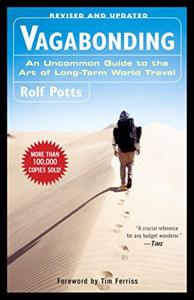
Want to learn the ideas in Vagabonding better than ever? Read the world’s #1 book summary of Vagabonding by Rolf Potts here.
Read a brief 1-Page Summary or watch video summaries curated by our expert team. Note: this book guide is not affiliated with or endorsed by the publisher or author, and we always encourage you to purchase and read the full book.
Video Summaries of Vagabonding
We’ve scoured the Internet for the very best videos on Vagabonding, from high-quality videos summaries to interviews or commentary by Rolf Potts.
1-Page Summary of Vagabonding
Overview
There’s nothing like taking time off from everyday life and traveling overseas. Typically, that’s what people call a holiday. And it usually doesn’t happen more than a few days every year. But what about vagabonding, that is spending weeks or even years traveling the world?
Sound interesting? Vagabonding is actually not about holidays. It’s also not related to the prejudice of many, who imagine a homeless man or someone looking for a place to sleep when they hear vagabonding.
The key points of the book are to travel more, especially in your twenties. The best time for vagabonding is when you’re young and have no family obligations. You need a lot of money to do this, but it can be done if you save up while working your way through school. Traveling on Russian taxis can be very fun because they’re so inexpensive and much faster than buses or trains.
Big Idea #1: Before leaving home to start vagabonding, you need to be independent.
Are you a vagabond? Before answering that question, ask yourself if you’re independent. Independence means being free from the notion that long-term travel is only for lucky people.
Many people think that they need to be rich in order to travel for an extended period of time. The movie Wall Street has a scene where Charlie Sheen’s character explains his plan on how he plans to make enough money so he can ride his motorcycle through China. However, most of us fail to realize the same thing as Charlie Sheen does: we’d probably make enough money by working as a janitor for six months!
Many Westerners think that travel is very expensive. However, it’s not just about buying a vacation package and going on a trip. Travel can be an experience that helps you grow as a person and get rid of your old self. It can also help you escape from your daily life.
Ultimately, our relationship with money is what makes us feel like we have enough.
To many people, money is a part of their daily lives. They think that they can’t travel because it’s too expensive. For this reason, long-term travel seems to be restricted to hippies or college students who are wealthy.
However, there are several reasons why you’re wrong.
Big Idea #2: The right time to start vagabonding is now.
The trip of your life doesn’t start with when you decide to go or the date of your departure, it begins with your attitude. It starts as soon as you stop finding excuses for delaying your journey and start saving money, researching where you want to travel and looking up maps. Vagabonding is about being open-minded and learning new things. This type of attitude isn’t something that can be picked up at the airport check-in counter; it’s something that needs to be cultivated over time at home.
Before you get your passport, you need to work. Earning money is important because it means freedom. You won’t be running away from anything if you have some cash in your pocket.
There are people who travel using their family’s money. They’re known in the backpacking world as “trustafarians,” because they never earned their freedom to do it. Because of this, their trip has minimal value to them and they’ll often say that they’re seeking meaning in their destination, failing to realize that the journey itself is what gives life meaning.
It’s about time we stopped letting those trustafarians have all the fun!
You should be clear about the difference between holidaying and vagabonding. Some people work to make a living, and then they travel as a reward for their hard work. Vagabonds travel in order to work, so they have a different perspective on traveling than other people do.






